Netanyahu, who first served as premier between 1996-1999 and won a second term in 2009, has carefully nourished his image as a bellicose leader, in the belief that tough talk and a projection of “strength” prevents wars.
That has been particularly evident in his approach to Iran, which Israel accuses of seeking to develop a nuclear weapon — a charge Tehran denies.
The US-educated Netanyahu, who during his military career served in the Sayeret Matkal special operations unit, is a loner with few close friends in the political establishment.
His defence minister, Ehud Barak, was a commander in the same unit.
The Gaza offensive began on Wednesday when an Israeli air strike killed top Hamas commander Ahmed Jaabari, sparking a rolling series of air raids Netanyahu called “a clear message to Hamas and other terrorist organisations.”
And 24 hours later, with no end in sight, he warned that Israel was ready to “significantly expand” its campaign against Palestinian militants in Gaza.
“Jaabari is Netanyahu’s Osama Bin Laden,” wrote Amir Oren in the left-leaning Haaretz newspaper. “It is living — that is, dead — proof of his success in hunting down a senior terror organisation leader.”
Netanyahu boasted in a speech to parliament last month: “During my term in office we did not engage in any unnecessary wars.
“In the seven years that I served there was no war and the level of terror went down. There was no war because we broadcast strength.”
These remarks were aimed at his predecessor Ehud Olmert, who in 2006 launched a 34-day war against the Shiite Hezbollah militia which left more than 1,200 dead in Lebanon and 160 in Israel.
And in late December 2008, just six weeks shy of general elections, Olmert launched a 22-day operation in Gaza to stamp out persistent rocket fire, which claimed the lives of 1,400 Palestinians and 13 Israelis.
Olmert, who retired in a corruption scandal which has largely been cleared up, has been mulling a return to political life in a move which could weaken Netanyahu.
But with the start of “Operation Pillar of Defence,” Olmert said he was postponing his decision.
For Gaza analyst Mukhaimer Abu Saada, the latest Gaza operation is a sure-fire way for Netanyahu to clinch electoral success.
“Netanyahu is basically trying to win the next elections in Israel and now he has a big ticket in his hand,” he told AFP.
Polls published last Friday showed that an electoral pact between the parties of Netanyahu and Foreign Minister Avigdor Lieberman, designed to strengthen both in January’s election, could have the opposite effect.
A survey by Smith Research for the Jerusalem Post indicated that if the election were held now, Netanyahu’s Likud and Lieberman’s Yisrael Beitenu would win a combined 37 seats in the 120-member parliament, compared with a current 42.
So far, the Gaza campaign has been one of carefully targeted air strikes which have killed 16 Palestinians, seven of them Hamas militants.
But with Gaza rockets killing three Israelis on Thursday and another hitting the sea south of Tel Aviv, it looked increasingly unlikely that the operation would remain an air campaign.
Should it include a ground incursion, this would probably mean more Israeli casualties, definitely affecting Netanyahu’s standing in the January 22 election.
“Netanyahu and Barak can mark a big victory right now, not only a security victory, but also an electoral one,” wrote Shalom Yerushalmi in Maariv.
“We mustn’t think for a moment that the escalation in the south was deliberate, but we may assume that Netanyahu and Barak couldn’t have dreamt of a better military-security campaign.
“One can only hope that this journey, which began in a focused and responsible manner, won’t boil over to dangerous avenues because of the elections, because then even the leaders will pay a dear price.”










































